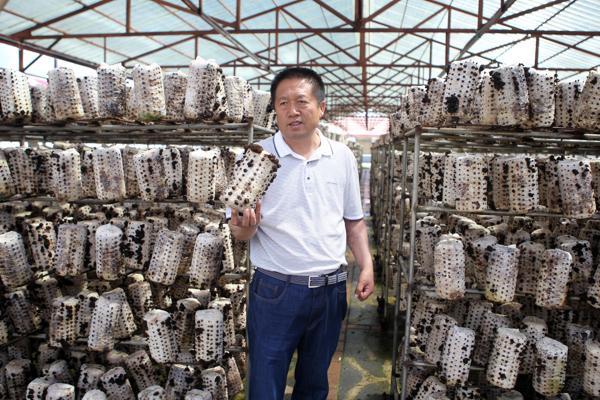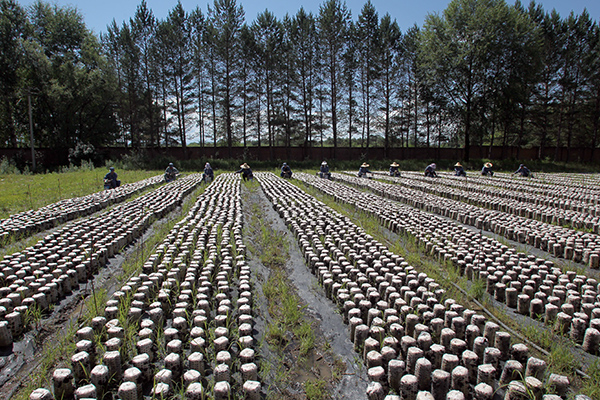
Yichun, also known as China’s “forest capital”, is now a destination for tourists.[Photo/China Daily]
The end of logging operations in State-owned forests has resulted in thousands of workers losing their livelihoods and forced local governments to restructure their economies.
Xu Huiqing has spent her entire life surrounded by the woodland around Yichun, China’s “forest capital”, in Heilongjiang province. She was born on a forest farm, worked as a forest ranger for three decades, and her nearest family members all worked in related industries.
It never occurred to Xu that the employment situation would deteriorate to the point that she, her husband, close relatives and colleagues would be forced to consider leaving Yichun to look for work.
However, the 43-year-old was one of the last batch of workers to leave their jobs in April last year, when a ruling that curtailed logging operations in State-owned natural forests came into effect.
The ruling was the coup de grace for the local timber industry, which had been in steady decline since the turn of the century when the coverage of natural forest began to recede. Many young people left Yichun to seek work in other cities, but Xu and her husband, who both were in their late 30s and had children and parents to support, decided to stay and take their chances.
Although no official data is available to show how the end of logging has affected local employment levels, the Yichun Development and Reform Commission estimates that 70,000 people have lost their jobs.

[Photo/China Daily]
“As a city with the forest economy as pillar industry, we are facing huge pressure from unemployment,” said a commission official, who declined to be identified.
The uncertainty that has affected Yichun for at least the past 10 years is just beginning in other woodland areas, and on April 1, logging operations were curtailed in State-owned forests in the northeastern provinces of Jilin and Liaoning and in the Inner Mongolia autonomous region. Other former forestry centers in the vast Greater and Lesser Hinggan Mountains and the Changbai Mountains also face unprecedented challenges.
Economic driving force
Yichun is home to 13 percent of China’s State-owned natural forests and the local logging industry has made a huge contribution to the country’s economic development. Data from the local development and reform commission show that in the past 60 years, the city has produced 270 million cubic meters of high-quality timber and paid 30 billion yuan ($4.83 billion) in taxes.
Those days are long gone, though, and now the city is facing its biggest challenge. “When I was young, towering trees about 50 centimeters in diameter could be seen everywhere. But now, the new trees are all smaller, with an average diameter of about 20 cm,” Zhang Baoku, a 48-year-old former forestry worker, said.
The end of more than half a century of logging resulted in Yichun’s annual revenue falling by more than 20 million yuan last year, the first time the city had registered negative GDP growth. Although the State Forestry Administration provides an annual subsidy, the amount is too small to balance the local government’s books.
Xu found it hard to cope with the transition. “I felt as though the sky had collapsed. We began looking for jobs downtown but failed because there was no work for the forestry-related factories and small workshops. They were badly affected,” she said.
“My husband finally found a job as a taxi driver, and our family got through the hard times on his monthly salary of 2,000 yuan,” she said.
With the logging industry gone, and with iron, another local pillar industry, in a downturn, economic restructuring has become a priority for the local government.

Workers collect edible fungi at Yichun Jinrui Forest Food Co. The company helps about 1,000 households to earn stable incomes.[Photo/China Daily]
“It’s not simply an economic problem, but also an important social problem for the government,” Sun Wenqing, deputy director of the Yichun Bureau of Commerce, said.
It’s not the first time that Yichun has attempted to transform its economic model. In 2005, it was named as an “experimental city for the economic transformation of forestry-based economies”, and allowed to establish new pillar industries. “We chose forest tourism, forest food and medicine, the exploration and development of resources, metallurgy and building materials as Yichun’s new pillars,” Sun said.
Last year, Yichun’s eight industrial parks attracted 152 businesses, and the city welcomed more than 6.3 million tourists, five times the resident population, who brought revenue of 5.36 billion yuan.
In June, Bu Jingyun, vice-president of Alibaba, led a company delegation to Yichun to inspect the business environment and discuss cooperation. The authorities are eager to attract the e-commerce giant, but there are hurdles to be overcome. “E-commerce is still in its infancy in Yichun and a shortage of e-commerce talent is our major obstacle. Cultivating more talent in this field is at the top of our agenda,” Sun said.
Despite overtures from businesses, the lack of sufficient financial support from central government and the State Forestry Administration mean the benefits of restructuring have yet to become obvious. “Yes, the process is difficult and long, but it will give people hope,” Sun said.
Branching out
Lines of neat, white houses stand at the foot of a mountain at Xiling Forest Farm in Yichun. The houses have all been fitted with modern amenities such as indoor plumbing, heating and private yards-a far cry from just three years ago, when the place appeared to be abandoned.
“When we had less and less work to do in the forestry bureau in 1990s, everyone wanted to sell their house and move outside or find jobs in other industries,” said Jin Feng, deputy director of the farm, located in Wumahe Forest District.
Jin offered to sell his 49-square-meter house, which was considered the best in the area, for 2,000 yuan per sq m, but there were no takers.
“We owe thanks to Gong Baomin, the president of Baoyu State Real Estate Development Group, who was born in Xiling, and responded to the dilemma facing the local people. The company not only helped us rebuild our houses, but also invested in tourism projects, such as hotels, hot springs and other entertainment facilities,” he said.
Many of the laid-off forestry workers, most of them in their 40s or 50s, have found jobs with the group as cleaners or gardeners, earning salaries of 2,000 to 3,000 yuan a month.
“Of Xiling’s 1,750 registered residents, no one is unemployed, except for a small number of lazy people who just don’t want to work,” Jin said.
Xiling was lucky that assistance was offered at exactly the right time, but few other districts have been as fortunate. Most have had to rely on their own efforts to create new jobs.
Wang Xianjun, general manager and a co-founder of Yichun Jinrui Forest Food Co, has had a rollercoaster ride in the past decade. As director of a timber mill in Hongxing district, Wang was in charge of more than 100 workers who processed, classified and transported the timber. When the mill closed, he found himself unemployed.
“Yichun is the national base for timber and we are really proud to have supported the country’s economic development in the early years,” he said. “But the good days ended in the 1990s. Every day, I was very disappointed because I had no way of handing out salaries to the workers,” he said.
“Sometimes, when people feel cornered they are inspired and their potential shines through. We considered many lines of business, and eventually we decided to produce edible mushrooms. It’s been hard, though-it’s not easy for people who were good at using axes and saws to work in a new profession,” he said.
After three years in business, Jinrui is one of the largest producers of edible mushrooms in Yichun, but as industry newcomers, the workers and management had to learn everything from the bottom up. “To us, the factory is our baby. We failed so many times, and the road to getting the factory up and running was full of hardships,” Wang said.
The company guarantees quality produce, so it focuses on the high-end market-its most expensive mushrooms retail at 1,600 yuan a kilogram-and the brand has already attracted a loyal fan base.
“Demand kept rising, so we decided to outsource some of the work to individuals, who grow mushrooms to supplement our factory production. We’re very proud to say we help about 1,000 households to earn a stable income every year,” Wang said.
The subcontractors buy bags containing spores and fungi and, after a few days of training, they begin cultivating mushrooms at home.
“The use of fertilizers and pesticides is strictly prohibited, and we have strict testing measures when we collect the mushrooms from households. As long as the fungi is untainted, we will collect it all, and the householders don’t need to worry about sales,” he said.
Other locals have started similar businesses raising pigs, deer and collecting wild vegetables, and now China’s largest bluberry-cultivation project has been established in Youhao district.
“Yichun is at a similar altitude to the major blueberry production bases in the United States and Canada. With an annual yield of 30,000 metric tons, the project has helped more than 1,000 people find jobs,” Yang Jianzhong, the director of the base, said.
Former forest ranger Xu is one of the “blueberry beneficiaries”; she has found work as a cleaner at the center and can earn as much as 2,000 yuan a month. “It’s a relief. The future is looking brighter, now, and I’m very happy to know I can stay in the forest with my family,” she said.
Zhou Huiying contributed to this story.
